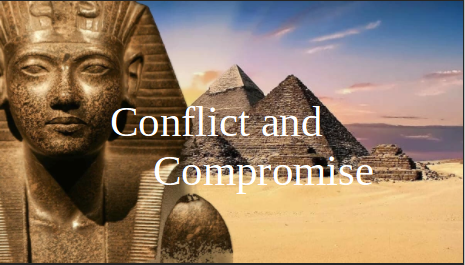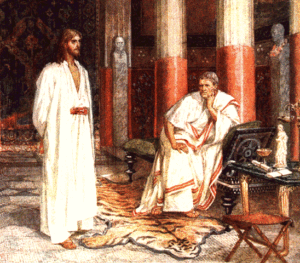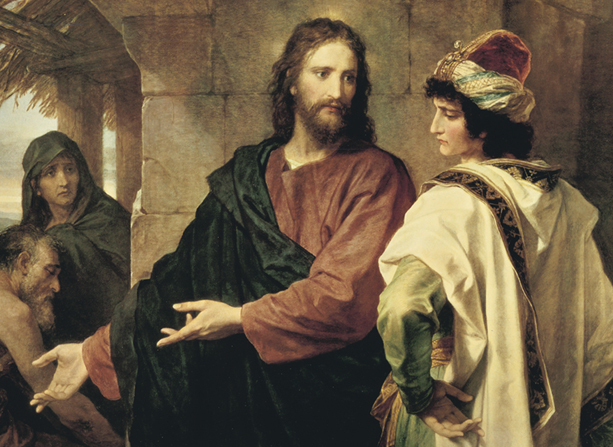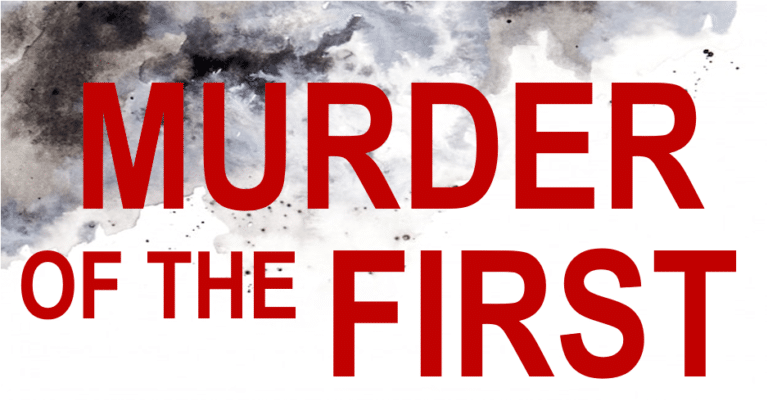When you become a Christian, you become a problem to the rest of the world. You may not notice it all at once, but with the change salvation brings about in your life, the world suddenly looks a little different. And because the ‘world’ is at war with you spiritually, it will attack your newfound faith or seduce you to compromise your commitment.
The moment you accept Jesus as Lord of your life, conflict with the world you just left ensues. No one likes conflict; in fact, humans go to great lengths to avoid it. And herein lies a danger; one way to prevent conflict is through compromise. Our adversary, the devil, and his cohorts know this and use it to their advantage.
But thanks be unto God, He has left us many examples of the wiles of our enemy in scripture. In this study, I would like to examine some of these ‘wiles’ or methods our enemy employs to force or trick us into compromise. While the general attitude of people today is ‘can’t we all just get along,’ it is in stark contrast to the teachings of our Lord Jesus. There is not one syllable in any of our Lord’s instructions instructing us to ‘get along with the world.’ Everything He taught us was the exact opposite.
Our Lord warns what the world thinks of those who follow Him. “You will be hated by all because of My name, but it is the one who has endure to the end who will be saved.” (Mathew 10:22). “All will hate you.” How many times has a smile cloaked deceit and hatred? Or how many times has the person who you thought was your best friend become the very same person who wielded the knife to stab you in the back?
The book of Exodus will be our source, while the interactions of Pharaoh and Moses will be our insight into the world’s tricks (represented in the person of Pharaoh). The followers of God (personified in Moses) will face the choice of conflict and compromise when dealing with Pharaoh.
The book of Exodus is rich in spiritual teachings; many a commentary has been and will be written mining out those spiritual truths, not to mention the historical accounts and the miracles it contains. But I want us to focus on the subject at hand, where we truly stand in the eyes of the world and how to deal with it.
So I intend to limit our investigation to the subject of conflict and compromise, focusing on the interactions between Moses and Pharaoh. We are the world’s enemy, and it will always seek to undermine our life in Christ. If you are not aware of this, as you grow in your faith, you will be. Believing we can be at peace with the world is a dangerous frame of mind. The spirit of the world is constantly at war with the spirit of God, as Ephesians 6:12 reminds us.
When I write, I make a great effort to limit the number of biblical passages I use when expounding spiritual truths in a single article. I’m afraid this article will require more Biblical texts than I normally sight to reveal the lessons contained in the interactions between Moses and Pharaoh.
In the Bible, Egypt is always a spiritual metaphor for the world. And as long as we are alive, our Christianity is notwithstanding, we physically live in the world. We are members of the citizenry of the world. As we proceed in our study, I hope it we will find the correct way to “be in the world, but not of the world.”
The personage of Pharaoh represents the world spiritually in word and deed. Life, livelihood, and death are all in his realm of control. His reactions and attempts to make Moses compromise will be part of the lesson.
The personage of Moses represents the followers of God. When confronting Pharaoh, being aware of the devil’s tricks through his obedience to God, his actions, and his choices will be the lesson from which we seek to learn.
Let’s review at the risk of redundancy; the location is in Egypt, and the timing is just before the Exodus. The cast of characters involved is Moses and Pharaoh. And their interaction is what we are examining.
But before we get to the meat of the subject, let’s back up a little bit to the time before Moses accepts his calling and his return to Egypt. Because along with his response to meeting God in Exodus 3 comes an almost automatic attempt to maintain peace at all costs. Even though Moses meets and now is a follower of God, he wants to keep his relationship with God private, unwilling to make his profession of faith public. Are we guilty of the same?
He’s not interested in going into the world and announcing that he is now a follower of God, called to rescue those still held as enslaved people in Egypt. Moses has it made. He’s discovered God and has a good life. A family, a heard, few neighbors, and very few complications. A life with little if any conflict. So naturally, Moses makes excuses why he cannot go:
“Then Moses said to God, “Behold, I am going to the sons of Israel, and I will say to them, ‘The God of your fathers has sent me to you.’ Now they may say to me, ‘What is His name?’ What shall I say to them?” (Exodus 3:13)
“Then Moses said, “What if they will not believe me or listen to what I say? For they may say, ‘The LORD has not appeared to you.” (Exodus 4:1)
“Then Moses said to the LORD, “Please, Lord, I have never been eloquent, neither recently nor in time past, nor since You have spoken to Your servant; for I am slow of speech and slow of tongue.” (Exodus 4:10) Finally, Moses relents and goes to Egypt.
The Conflict Begins
We find the first confrontation between Moses and Pharaoh in Exodus 5:1, “And afterward Moses and Aaron came and said to Pharaoh, “Thus says the LORD, the God of Israel, ‘Let My people go that they may celebrate a feast to Me in the wilderness.’”
The response from the leader of the world is immediate, “But Pharaoh said, “Who is the LORD that I should obey His voice to let Israel go? I do not know the LORD, and besides, I will not let Israel go.” (Exodus 5:2).
Can’t you hear the mockery of God in his response to Moses? ‘Who is the Lord?’ It’s as if he is saying, ‘so you met God, big deal. You are in the land of Egypt; we have lots of ‘gods’ and have had for centuries. Why would you think I would pay any attention at all to your God? I decide which god to obey, and I will not
listen to Him.’
Today, the same thing happens to Christians when you tell an unbeliever you know about your salvation. Those you tell may not be as brash and belittling as Pharaoh was. They might roll their eyes and say in a slightly sarcastic tone, ‘that’s great.’ In reality, they will look at you in a whole different light from now on. They will conduct themselves differently when they are around you.
Your newfound morality will be an issue: the refusal to lie, cheat, and steal, like non-believers, will cause some of your friends to forsake you. At the very least, you will be the butt of smug comments and excluded from many of your old groups or clicks. Your welcome is suddenly wearing out.
Moses and Aaron make a simple request “Then they said, “The God of the Hebrews has met with us. Please, let us go a three days’ journey into the wilderness that we may sacrifice to the LORD our God, otherwise He will fall upon us with pestilence or with the sword.” (Exodus 5:3)
To this request, Pharaoh responds with anger. “But the king of Egypt said to them, “Moses and Aaron, why do you draw the people away from their work? Get back to your labors!” (Exodus 5:4)
‘Now that you have chosen to follow God I want you to understand it conflicts with the accepted way of the world I will make your life difficult,’ says Pharaoh. Why would you want to take some time from your work to serve God? That is not beneficial to the world. Do you want to stop working fifty or sixty hours a week in pursuit of possessions and spend time with God?
The time we set aside for God subtracts from our pursuit of worldly possessions and is harmful to the purpose of the world -keeping you a slave in the pursuit of temporary things. At which point we are accused of being lazy, just as Pharaoh accuses the Hebrews, “But the quota of bricks which they were making previously, you shall impose on them; you are not to reduce any of it. Because they are lazy, therefore they cry out, ‘Let us go and sacrifice to our God.” (Exodus 5:8).
Now the choice between serving God and serving the world becomes a choice. And each choice brings about a result. This time the result is ‘Since you want to cease serving me and serve God, I will now make your life more difficult,’ says Pharaoh. When relationships with former friends and acquaintances change, it usually begins with our livelihood. Often making our secular jobs more difficult, we become less of a team player, because we are unwilling to put the world’s good ahead of God.
“You are no longer to give the people straw to make brick as previously; let them go and gather straw for themselves. But the quota of bricks which they were making previously, you shall impose on them; you are not to reduce any of it. Because they are lazy, therefore they cry out, ‘Let us go and sacrifice to our God.” (Exodus 5:7-8).
Let me take the opportunity to correct some myths about straw and brick making in Egypt. Despite Hollywood depictions of the Hebrew slaves mixing straw in pools of mud with their feet, like ancient methods of treading out grapes, to make bricks is make-believe. Examinations of antique mud bricks in Egypt don’t contain straw; they are pure mud.
Ancient mud bricks were dried by the sun and by fires made with straw. The quicker of the two drying methods were with straw. Which up to this point was gathered and delivered to the Hebrews, expediting the process. The Hebrews had a daily quota of bricks to produce, and the amount of straw to meet the quota was provided for them.
But now that they had to go and gather straw on their own, the drying process would take much longer. Adding the additional task of collecting the needed straw is how Pharaoh would punish those who wished to spend some of their time serving God. Gathering the required straw would require extended work hours since there would be no reduction in the daily brick quota. The world was retaliating in an effort to make the Hebrews begin to question their choices.
It became clear; if you wanted to take time away from service to the world and invest it in time with God, it was going to cost you. There was a price to pay. Sadly there are parts of the world today where a Christian confession is a death sentence, and we should remember that when we begin to whine about our sometimes petty trials and conflicts with the world.
Before we succumb to compromise, we should never forget God protects His own. God is there even when we think He isn’t. What a gracious God we serve! Always the Shepard is watching His flock. And God reminds Moses of this, “Then the LORD said to Moses, “Now you shall see what I will do to Pharaoh; for under compulsion he will let them go, and under compulsion he will drive them out of his land.” (Exodus 6:1)
Once Pharaoh realized he could not punish the people into submission, he changes tactics. He switches from direct threats to appeals of compromise. You see, the world needs us far more than we need it, and it will do whatever is necessary to keep us in its grasp. I do wish we as Christians would realize this and use it to our advantage, being to the glory of God.
The First Compromise
It is now just after the third plague, and Pharaoh is beginning to think the power of God is involved in bringing about an end to the captivity of the Hebrews. Although the three plagues wrought on Egypt are miraculous signs revealing the power of God, the most significant miracle is one of separation.
God would shield the Hebrews from the effects of this plague, “I will put a division between My people and your people. Tomorrow this sign will occur.” (Exodus 8:23). I love the phrasing of this verse; My people and your people. There is a spiritual separation between God’s people and the world. Only by our disobedience and poor choices do we allow ourselves to jeopardize this separation. We willingly go back into the world God has shielded us from, just as many of those who left Egypt would try to return to later in the account of Exodus.
The attraction of the material things of this life is powerful. It’s a constant struggle for Christians to maintain separation from what we became accustomed to in our former way of life. If you think our salvation is an instant cure for the lure of the world, you are mistaken. Maintaining your distance from the world’s conveniences is a daily struggle and the minute you let up is when you become most vulnerable to compromising your walk with the Lord.
“Pharaoh called for Moses and Aaron and said, “Go, sacrifice to your God within the land.” (Exodus 8:25). Let’s look closely at this offer? The world comes to Moses, and sometimes the world will come to you seeking compromise. It’s a sincere gesture on Pharaoh’s part, yet not without a reciprocating gesture on Moses’s part. Pharaoh is surrendering a little to get a little. He’s saying, ‘fine, sacrifice to your God, but stay here.’ Do you see the veiled trickery here?
Pharaoh (remember personifying the world and using the wiles of Satan) knows he has a better chance of the Hebrews either compromising their worship or eventually failing to worship God at all if they stay ‘in the land.’ Close enough to the surroundings and possessions of their old way of life, they will always be at risk of what we would refer to as backsliding.
Is this not true even today for followers of Christ? Your friends suggest they understand you’re a Christian now but propose you can still frequent the same bars and parties just like you did before your conversion. It will be OK; the world suggests; ‘I’ll give you a little respect regarding God if you will kind of stay within reach of your old life.’
The Christian calling for most of us is to still live in the world, so we must always be on guard against those tricks that can so easily woo us back into our former way of life. Moses didn’t fall for this attempt. He knew the only proper way to sacrifice to the Lord is first by sanctification -separating yourself from the world.
“Therefore, come out from their midst and be separate, says the Lord. and do not touch what is unclean; And I will welcome you.” (II Corinthians 6:17).
Moses rejected this offer because the Hebrew sacrifice would fly in the face of what the Egyptians considered sacrilege. Being raised in the land, Moses knew all about the religious practices of the Egyptians, and he was well aware of the reverence they had for the very animal God instructed them to sacrifice -a lamb.
In Moses’s time, the Egyptian god Amun was considered a chief, if not the chief god, whose image was a sheep (or lamb). Do you see the deceitful way Pharaoh was trying to get the Hebrews to come in direct conflict with the Egyptians? Had Moses accepted this compromise, it would have meant an all-out war between the Egyptian people and the Hebrews.
If this war had happened, a trained Egyptian army against untrained, domestic enslaved people would not have been a contest; it would have been a slaughter.
This compromise, as all compromises do, implies certain boundaries. The Hebrew’s could sacrifice to God if they stayed in the land, and by do so, they would be admitting their God was no different from the rest of Egypt’s gods. And the second boundary was they were not allowed to condemn the worship of the established gods in Egypt. Now, think of this in today’s world; you can worship the Lord and be a Christian as long as you don’t condemn with the established gods of the world.
In other words, you are not allowed to criticize how the world operates. You cannot speak out against bars, whorehouses, gambling casinos, corrupt government officials, homosexuality, and abortion. You have shown your unwillingness to compromise when you do, which brings you right back to the doorstep of conflict. What will you do?
The Second Compromise
We will need to look at more than one verse since Pharaoh offers this next compromise in such a way as to trip up Moses by his own words. “So Moses and Aaron were brought back to Pharaoh, and he said to them, “Go, serve the LORD your God! Who are the ones that are going?” (Exodus 10:8). Pharaoh already knew who Moses was planning to take with him, yet hoping Moses would make a mistake and leave someone or something out, he would achieve compromise by deceit.
Moses’s answer is exactly as was the previous response “Moses said, “We shall go with our young and our old; with our sons and our daughters, with our flocks and our herds we shall go, for we must hold a feast to the LORD.” (Exodus 10:9).
In Exodus 10:10, we find a secondary part of the attempt by Pharaoh to get Moses to compromise, but this time it’s in the form of an accusation and a false sense of concern for the innocent. It doesn’t seem to make sense when you read verse 10 by itself. But looking at a couple of different translations of verse 10 will help us understand what Pharaoh is saying and trying to do.
“Then he said to them, Thus may the LORD be with you, if ever I let you and your little ones go! Take heed, for evil is in your mind.” (NASB 1995)
“Then he said to them, The LORD had better be with you when I let you and your little ones go! Beware, for evil is ahead of you.” (NKJV)
“And he said to them, So let the Lord be with you: as I will send you away, must I send away you store also? see that evil is attached to you.” (The Septuagint)
“So he [Pharaoh] said to them, So may the Lord be with you, just as I will let you and your young children out. See that evil is before your faces.” (The Tanakh or Hebrew Bible)
Each of these translations is slightly different in phrasing, but what Pharaoh is accusing Moses of becomes more apparent if we consider them all accurate. Paraphrasing this verse may help: ‘You want to take your little ones with you so you can sacrifice them to your God in the desert,’ says Pharaoh. He is accusing them of child sacrifice, which was neither practiced nor allowed in Egypt.
Then Pharaoh’s fake sense of concern for the welfare of the innocent children becomes a reason not to allow Moses to take the children with Him. As if to say, ‘I’m not going to let you take the children because you will harm them.’ ‘It’s for your own good that I won’t let the children go with you,’ says Pharaoh.
So Pharaoh, in retort, says, “Not so! Go now, the men among you, and serve the LORD, for that is what you desire.” So they were driven out from Pharaoh’s presence.” (Exodus 10:11). The conflict is coming quicker and more hateful. “They were driven out of Pharaoh’s presence.”
“The men among you.” The men only? What did Pharaoh hope to accomplish? Sure, the men can go. Just leave the rest of the family behind. Pharaoh knew if the men left their families behind, they would surely return. Still, more insidiously, Pharaoh knew if the wives were left behind, coercing them to reject God or even killing them would be easier with no men to defend them. The key was the children.
Mothers would do whatever was required of them to protect their children, even if it meant rejecting God and continuing to worship the Egyptian gods. But beyond this was the knowledge that children are the future. To continually keep a slave population, you need children of enslaved people to continue the servitude.
If we are going to serve God effectively, we cannot leave our families behind. The children are not only our future, they are our heritage. The way to ensure our children follow the Lord as we have chosen to do is to never leave them behind at the world’s mercy. We must never allow our children to fend for themselves in the world without the correct spiritual instruction. If we do, they might forever be slaves to the world in which we left them.
Evangelizing for God and ignoring your families is what the world wants, not what God wants. Because we fail to evangelize our households, many Christian family traditions have ended after one generation. God wants our service to Him to be generational -passed from father to son, mother to daughter. We could learn a great deal on how to accomplish this by examining the families of Orthodox Jews. To them, family is second only to God.
So crafty Pharaoh suggests a compromise along with a fake sense of I’m doing it for the children. Moses says no, so now it’s war. Spiritual war. At this point, Pharaoh knows he’s losing the contest. He can feel the darkness closing in on him, so he makes one final attempt at getting Moses to compromise.
The Third Compromise
“Then Pharaoh called to Moses and said, “Go, serve the LORD; only let your flocks and your herds be detained. Even your little ones may go with you.” (Exodus 10:24).
‘You can take your families, but you must leave behind all your possessions. If you go, you will leave with nothing. You being slaves, everything you have belongs to me,’ says Pharaoh. Now some may be quick to think because the Lord tells his followers to forsake their possessions and follow Him; this represents a contradiction of scripture.
Such is not the case. Our Lord never asks you to forsake what you need to worship (or serve) Him. Moses needed the herds to provide a sacrifice to God and to provide sustenance for the three-day journey. It’s no different for us today. We don’t need all of our possessions to serve the Lord, but we need some.
It is fair to say most of what we have today, possession-wise is of little use in our service to the Lord. Take what you need to serve the Lord and leave the rest behind. If you are single like the Apostle Paul, little is needed. A little more is needed if you have a family.
Your family will need a place to live, clothes to wear, food to eat, etc. These things are what you will need to serve the Lord. Pharaoh’s last attempt to get Moses to compromise was to give up everything, except your families, and leave, as if to say, ‘if you want to go and serve God, it will cost you dearly, it will cost you everything of material value.’
You see, the Lord asks you to give up the possessions voluntarily you don’t need and serve Him. Pharaoh (the world) demands service to God will cost you everything. Many people have turned back at this point, rejecting the way of the cross in a vain compromising effort to keep their possessions. In the end, Moses’s rejection of this last effort of compromise results in total conflict.
“Then Pharaoh said to him, “Get away from me! Beware, do not see my face again, for in the day you see my face you shall die!” (Exodus 10:28).
We are familiar with what happens next. Being driven out, in exact contrast to Pharaoh’s declaration of losing everything, the Hebrews leave with the wealth of Egypt. They experienced the victory of freedom for the first time in over four hundred years. The Hebrews were redeemed from slavery by the hand of God. Salvation gives us victory over the world. But know this; the battle of conflict and compromise is continuous.
The world is continually in pursuit of our new life in the Lord. Just as Pharaoh pursued the Hebrews until death after they left, the world pursues us in our new life in Christ. It’s a daily battle, but the Holy Spirit gives us the ability and strength to overcome. I have outlined three ways our enemy, Satan and his cohorts, tries to get us to comprise our walk with the Lord using the examples left to us in Moses’s confrontation with Pharaoh.
The closer our walk with God, the more of an enemy to the world we become, all but ensuring conflict. If your life is ‘conflict-free,’ maybe you have compromised or are compromising in your relationship with the world—just a thought.
There are many more tricks and traps to be on guard against, but I hope by exposing the ‘whiles of the devil’ shown in our study of Exodus, we can learn to spot other tricks as they come about. If we are faithful not to compromise our walk with the Lord, God is faithful and will deliver us just as He did the Hebrews.
Today, the big push is ‘can’t we all just get along?’ Do you not see this as identical to the offers of compromise Pharaoh made? Times change, but the tricks are the same.
Now that we are aware of some of the stratagems employed by our enemy to deceive or force us into compromise, we must not think knowing is the end of the matter.
For we all, as Christians, will stand where Moses stood and face the same choices. What will you do? There is no third choice, only two—stand firm in your faith or compromise. With either option, there is a cost.
At first glance, settlement may seem like the best choice, but it only seems that way because it offers an immediate remedy to avoid the coming conflict. And too often, we make these compromises in haste or out of fear, not weighing the ultimate cost.
Compromise is a downhill path, a slippery slope; once you compromise, any subsequent compromise becomes a little easier, and so on until you find yourself living your life at the whim of the world. Without knowing it, you’ve become a slave once again, no longer a threat to the world.
If we choose to stand our ground in faith, the conflict will come. But remember, the days of this life are short compared to eternity; whatever the world dishes out, the price we pay is minor and only temporary.
But God is faithful and has given us a help-meet in the Holy Spirit to teach us to recognize our enemy and the strength to overcome the world. The Holy Spirit instructs us to make the right choices. The right choice is the rejection of compromise and following the will of God even in the face of fear.
Be Advised
“Behold, I send you out as sheep in the midst of wolves; so be shrewd as serpents and innocent as doves.” (Mathew 10:16).
Be Warned
“You adulteresses, do you not know that friendship with the world is hostility toward God? Therefore whoever wishes to be a friend of the world makes himself an enemy of God.” (James 4:4).










+ There are no comments
Add yours